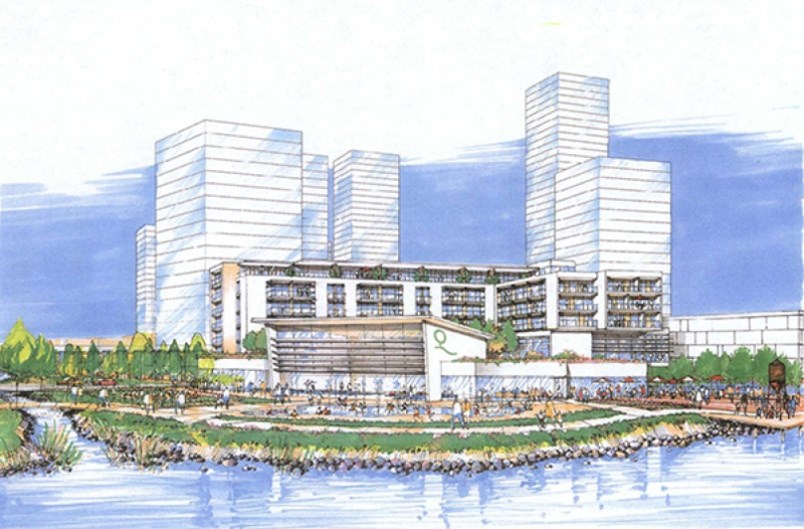The Fraser Mills reboot is in its final stages and now it’s time to begin getting it online, according to the developer.
The 95-acre project being put together by Beedie Living between United Boulevard and the Fraser River was put on hold in 2008 after the original plans had gone through the official community plan stages with the city of Coquitlam. The economic crisis of the era delayed the plan until 2016, when Beedie revived it, making some major changes.
But before it can begin building, there are still some hurdles to clear at city hall.
“I wouldn’t say we’re anxious. We’re very motivated, very keen, we’re ready to go," said David Roppel, Beedie Living’s director of residential development, shortly after delivering a presentation on the project to a gathering of about 50 at a luncheon in Coquitlam organized by the Real Estate Institute of BC.
"We spent two years on the reboot, and it’s been very positive and all the additions have been improvements to Fraser Mills, so we’re ready to build it," he told The Tri-City News.
The Beedie Group bought the land in 2004, long before the division Roppel heads was formed. The property had previously been occupied by the Fraser River Sawmill, one of the largest operations around. It was so big, it had trouble recruiting workers and brought in many from outside B.C., including a contingent from Quebec that eventually settled in Maillardville.
“That’s formed a lot about Fraser Mills and what we want to do there and connect with Maillardville and the rest of the Lower Mainland,” Roppel said.
In addition to the 4,700-unit residential component, the project, which is being billed as Coquitlam’s only community with waterfront access, is expected to have 16 to 18 towers, industrial buildings employing approximately 1,500, and 13,000 square feet of commercial/retail space.
Along with all the water access — including a wharf and a pier — the centrepiece will be a 30,000-square-foot riverfront aquatic complex, a plaza and a pier that Beedie will build for the city.
“This will be the beating heart of Fraser Mills,” said Roppel, who called the aquatic centre the crown jewel that will help attract not only its residents but neighbouring ones as well. “It’s a good community building tool. It’s a draw and any community needs a draw. It’s the new wow factor.”
The original plan called for a community amenity building but the city asked Beedie to do more. Roppel said the cost of the complex will exceed what Beedie would have been required to pay in amenity fees and the company is fine with that.
“That was good in 2008 but it’s not what we want to do in 2016 or 2046. We want it to be knitted into the rest of Coquitlam,” Roppel told his audience. “It’s needed for everyone to get down to Fraser Mills. whether you live there or not, because it will be the spark to get everyone to Fraser Mills.”
Roppel said the development will have more than 16 acres of parks, more than triple what’s required.
“That’s a good starting point for planning a community,” he said.
The parkland will include a kilometre-long foreshore walkway, bike trails, soccer pitch, tennis courts, open space and public art representing the heritage and present-day aspects of the region.
“This will be a rich, urban environment,” he said.
With industrial land at a premium, Beedie has begun some of the development by building structures at the south end of King Edward Street. One of them is occupied by Olivier’s Breads bakery, which has a retail space as well as a production facility, a combination Beedie wants to promote.
“They’re the incubator for what we want to do at Fraser Mills,” said Roppel, who added the French connection between the bakery and Maillardville was a coincidence. “We didn’t plan that. If we could’ve, we would’ve, but it worked out well.”
Roppel said Beedie will pay about $55 million in development cost charges to the city to build infrastructure to support the $3.3-billion project, including $5 million it paid toward construction of the King Edward Overpass. He said other public benefits include 118 market rental homes, 117 below-market rental units, $300 million in total public benefit (including the aquatic complex) and $9 million in annual municipal tax.



